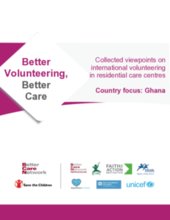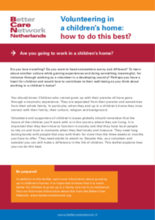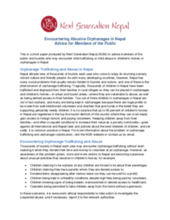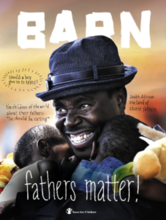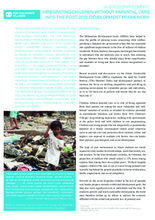Demographic Data
|
Sources: World Bank, UNICEF, UNDP HDR 2015, DHS 2013 |
Displaying 12531 - 12540 of 14580
This overview is intended to contribute to discussions on international volunteering in residential care centres as an anecdotal research piece on the situation in Ghana.
This leaflet was developed by the Working Group ‘Quality of Care’ of Better Care Network. It is published by Better Care Network Netherlands. The leaflet provides useful information on child development and children’s care for those planning to volunteer at orphanages in developing countries.
This is a short paper produced by Next Generation Nepal (NGN) to advise members of the public and tourists who may encounter child trafficking or child abuse in children's homes or orphanages in Nepal.
In this study, the researchers conducted a systematic database and a thematic hand search of the global literature on parenting interventions in order to gather and assess the evidence on father participation and impact in parenting interventions. This article presents the results of the study and identifies three key priorities for successfully engaging fathers.
Barn is a magazine about children’s rights published by Save the Children Sweden with four issues per year. This issue is focused on the role of fathers in children’s wellbeing and development.
This leaflet was developed by the Working Group ‘Quality of Care’ of Better Care Network. It is published by Better Care Network Netherlands. The leaflet provides useful information on child development and children’s care for those planning to volunteer at orphanages in developing countries.
This animated video, produced by Save the Children, tells the story of Suman, a boy whose mother sends him to a care center as she is having difficulty caring for him.
This Human Rights Watch report gives a detailed overview of the situation faced by children with disabilities in orphanages in Russia.
The Guidelines for Kinship Care, Foster Care and Supported Independent Living in Liberia are intended to provide harmonized national guidance for child welfare practitioners in order to improve the quality of family-based alternative care services in Liberia, particularly for children without appropriate care (CWAC).
In this paper, SOS Children’s Villages demonstrates how children who lack or are at risk of losing parental care are highly vulnerable to various forms of poverty and inequality. The paper proposes operational strategies for action as well as targets and indicators designed to monitor progress among these children.

